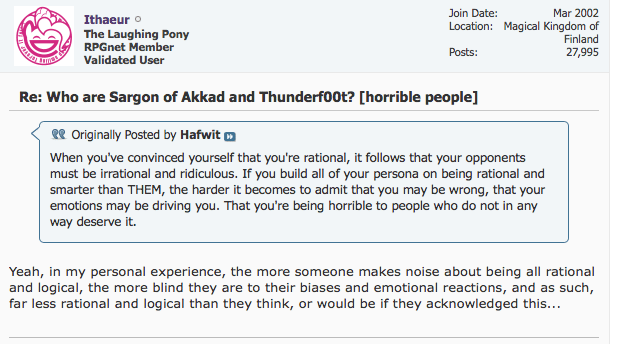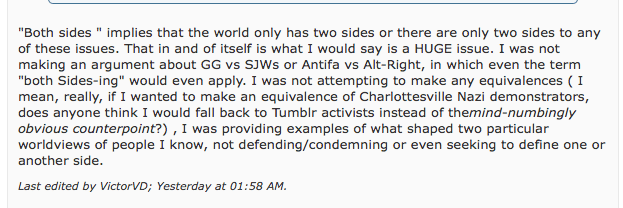This past week I was on holiday to go take pictures of the New England autumn foliage, and as a result I didn’t have a chance to really monitor this blog statistics at all. This morning I took a look and was surprised to see a spike in “attendance” on Oct. 17:
Normally I get a lot of traffic for the tech pieces, but when I saw an influx of traffic for the Post-Mortem of the Debate Between Sargon of Akkad and Dr. Kristi Winters, I knew that this would get interesting.
Tracing my way back through the referrer links, it seemed strange because it came from RPG.net, a roleplay gaming forum. Having done a lot of table-top gaming, I thought it was pretty cool to be introduced to the site, even if I don’t have the time to partake any more.
I couldn’t see the thread that linked to the articles, so I registered in order to see what was up. Turns out there was a thread on Sargon and Thunderf00t. Now, I have never spoken with either of them, and they certainly don’t know me, so I my motivation was genuine curiosity.
So, obviously, the thread was not going to be complimentary. Still, curious, I went further down the rabbit hole to find out what brought people to the site. It didn’t take long to find the link:
When I wrote the post-mortem, there really wasn’t much interest in it at the time. These people, obviously, have a great deal of passion for all things SJW (and, not to put too fine a point on it, a great deal of hatred for Sargon and Thunderf00t), but this was more interest in the work than I had gotten in a while so I wanted to know what they had to say – good or bad.
I had a feeling that I might want to seriously consider responding to any criticism, and if there were 1) the opportunity to do so, and 2) a chance of a reasonable discussion, I would be happy to engage. Unfortunately…
I was blocked at 1), so I have to do 2) here. It’s turned into something of a “director’s commentary” on a previous piece (and is also a great example of meta-metacommunication). 🙂
The Reaction
As one might expect, there was a great deal of pushback on Part III, where I offer some suggestions of what Sargon could have done to even the playing field in his side of the debate. While there are a few decent criticisms of my post, which I will try to address, many of the reactions devolve into ad hominem metacommunicative analysis, rather than discussing any merits of any points.
I actually thought this was a legitimate criticism, for the most part. ANT Pogo correctly calls out my argument for not being scholarly, using primarily popular sources (though there were no links to Brietbart). I did link to a Christina Hoff Sommers video, and I did link to a Daily Mail op-ed piece.
I also linked to:
- Manchester Evening News, The Atlantic, The Jerusalem Post
- Videos of feminist doing bad things
- Articles by feminists advocating domestic violence
- Congressional Acts
- Law journals
- Advocacy groups
- Academic position papers
Now, here is the kicker: I was not debating Kristi Winters. In fact, had there been a debate between me and Dr. Winters, it would likely be unwatchable as a YouTube event because it would be very academic. By choosing a more “approachable” means to establishing the negative’s position, I was attempting to illustrate what Sargon could have done to bolster his points – not that I would have necessarily made the points he made (I wouldn’t).
I have not seen “hbomberguy” so I cannot speak to whether or not he “exhaustively dissected” the rape statistics argument.
Nevertheless, the key thing here is that Sargon did not just lose the debate because he didn’t follow the proper rules. This is what ANT Pogo misses: Sargon lost because the rules of the debate (that he did not follow) exposed the weaknesses of his position.
Casaubon follows up with an excellent point:
This is possibly very true. It seemed to me that the debate structure was right in Dr. Winters’ wheelhouse, and so she was able to use it to her advantage (see the section on Structural Failure in Part III). American academic debate structure is fixed and rigid, unlike the “open debates” we often see at, say, Oxford or Cambridge.
However, the moderators of the debate had apparently communicated with Dr. Winters and Sargon about the debate structure in advance, so Sargon wasn’t completely ignorant of the rules here. Either way, the responsibility did fall on him to learn them beforehand.
ANT Pogo is back again, though, with some psycho-analysis about me:
It’s true that I thought that The Red Pill was worth watching, whether you agreed with the conclusion or not. I also think it’s important that no one gets to decide what you can and cannot see or read. I gave the film a 7 out of 10, so in my mind I think it falls far short of a “glowing” review.
ANT Pogo highlights several other articles that I’ve written, implying a trend of complaining and, well, paranoia. The poster even pulls out a blog post from 2003 (“Government, Our God“) which – ironically – illustrates many of the exact same thoughts that the RPG.net thread echoes in later posts about fascism. Here, however, it’s used to illustrate a very different metacommunicative narrative.
[Side note: ANT Pogo linked to another post from 2003 called “The Self-Obsolescence of Ultra-Liberal Academics“, something I haven’t seen since I republished it in 2009. Upon re-reading it, it’s actually scary how prescient it was about modern-day academic discourse]The post about Affirmative Action (in which I begin by saying I’m not a fan of race-based decision criteria, because of the propensity for abuse) is all about how the conversation regarding race relations tends to be hyper-emotional, and ANT Pogo actually illustrates the red flag-waving (pun intended) in front of the bull, here.
What’s more, though, is the question that is left un-asked: why is “reason and rationality” a red flag? This is something that recurs throughout the comments.
Nevertheless, Mataxes – the person who shared the link – isn’t impressed, though:
Fear not, my friend. I make no money from this site, and my ego is not dependent upon whether or not people like what I read. Unlike some in the thread, I don’t care whether or not someone agrees with me; I care whether or not they can reason with me. Oh, wait – that’s in my about page that ANT Pogo quoted. Sorry for being repetitive.
More on this a little later. For now, though, Mr./Ms. Pogo is none too happy with me:
There is a great deal of ad hominem to unpack here, but let’s give it a go.
“The guy who insists that his bullshit opinions are merely the result of cold, dispassionate intellectual logic-based facts…”
Opinions are, generally speaking, bullshit – almost by definition. Opinions are positions that one takes without evidence or support. Arguments are when you take an opinion and you state them as a claim, while providing factual support for why that claim has merit.
So, when you can support your opinions with “cold, dispassionate intellectual logic-based facts,” then you are establishing a position that is based upon something more substantial than “because I feel it ought to be this way.” And yes, that is what makes arguments superior to opinions.
“If you disagree you’re just an overly-emotional SJW type who can’t handle the Uncomfortable Truths he dishes out.”
Not even close. As I stated before, I do not care if one agrees with me. Agreement and being overly-emotional are mutually exclusive. If someone passionately agrees with something I say but doesn’t understand why, or doesn’t take the time to intellectually challenge the presumptions, then we are still no better off in getting to a greater understanding. That’s the very definition of an echo chamber, and it would be disingenuous to say that my echo chamber is better than your echo chamber just because I have more people who agree with me in it.
“… pseudointellectual air to try and make their nonsense arguments sound more convincing than they really are.”
You really can’t have it both ways. Either Sargon, Thunderf00t, James Damore (the Google engineer), or even myself, have opinions, or we have arguments. According to Pogo’s line of thinking, if the opinions are bullshit and the facts are incorrect, it should be extremely easy to dispute or debate. The reason why arguments are convincing (and are used to win debates) is because they have relative merit.
What Pogo is arguing for here, ironically, is a more emotional, passionate litmus test for quality of opinion. That is, if you are really passionate about something, non-factual, and agree with him/her, then the quality of your opinion is high. Such a position is, unfortunately, highly tautological and will not ever allow for the possibility that you could be incorrect.
Perdidas, however, agrees with ANT Pogo:
I know that Thunderf00t has a Ph.D in a hard science (I forget which). I have a PhD with formal training in sociology, psychology, communication theory, and history.
So, I reach my conclusions based upon 25 years of academic research and experience. I have never been on 4chan.
Mataxis concurs with Perdidas:
“SJWs” are known for their emotional reaction to stimuli, rather than reason. There are many examples when this very scenario has played out. However, I’m not sure where the “woman” part comes from, as that appears to be something of another red flag in front of the collective bulls in the forum. At the very least it’s a red herring.
Coyote’s Own tries to bring it back to the debate, I think:
In the debate, Sargon spent a great deal of time trying to minimize Sociology as not a “true” science. This is because he, himself, has never had to go through the rigorous process of understanding the scientific method which is applied in all of the disciplines identified here. In this, Sargon is most certainly, definitely wrong.
There are actually quite a few posts like this, but since it’s obviously not my position I’ll leave it at that.
ANT Pogo is back, and I don’t think I’ll be getting any Christmas cards:
This is worth examining with some effort and attention, I think. Pogo has scanned a number of the articles on this site, and for that I must applaud the effort. Nevertheless, it appears that there is quite a bit of reading comprehension that has been missed.
“[F]aux-philosophical meanderings based upon… IT-type process flows from the tech industry to things that those flows are horrifically unsuited for.”
This is actually an interesting take, and the exact opposite of how I’ve perceived my own writing style. As a result, it is certainly something worth considering and examining.
I have always thought my approach was too academic, not too “techie.” I’m a long-form author in a short-form world, and as a result I’ve always felt that clarity was far more important than brevity (much to my readers’ chagrin, I’m sure).
The thing about academia and the tech industry, though, is that the scientific method is present in both. Process can be extremely important for both, and the reason why is very simple:
You need to know when you’re wrong.
The scientific method and the technical process both have built-in safeguards for catching errors and, if you do both of them correctly, you can catch those errors early.
This excerpt from the above post is something I find particularly interesting, and is worth highlighting:
he does a whole lot of diagramming out how each part of the debate matches up to some outline of a generic formalized official debate structure, talking about Sargon’s failures in the debate like he’s a video game player who failed to complete enough certain specified objectives, while his opponent did, granting her the win in the debate by default completely independently of the topic they were actually debating (and that’s his argument – that Winters only won on a technicality, because her actual argument is so obviously incorrect).
The diagramming was done to explain to people who are not familiar with the debate process (that Winters was using) to give a visual explanation of what was going on. Many viewers of the debate are not trained in the style she was using (nor Sargon, apparently), and without knowing the rules it’s very similar to walking onto an Australian Rules Football pitch with only a knowledge of American Football – some things may look familiar, but you’ll get lost very quickly.
Debates do have “winners” and “losers,” though. It doesn’t surprise me that someone on a role-playing game forum would use the analogy to a video game, but it doesn’t negate the fact that at the end of the debate (which is a contest), you will have both.
Here’s the thing that seems to be lost on Pogo and others: You can win a debate on a subject you disagree with.
Winters did not win the debate on a technicality, and I never said that she did. She won that debate fair and square, with a connected series of statements and examples designed to establish a position – a position that Sargon could neither refute nor rebut. The fact that Sargon was wandering around on the field, unsure of which goalpost was his to aim for, exacerbated the situation and is a valid observational point, IMO.
I watched the debate because I had really wanted to see a good academic debate on the subject, not because “her actual argument is so obviously incorrect.” In the academic writings that I have seen with respect to Feminism, there have been very few that avoid the common pitfalls of an Appeal to Emotion, and I was hoping that there would be, in fact, some good information that would expand my understanding.
Herein lies the Catch-22, though. A YouTube debate, even with the proper structural rules, is not conducive to this type of discourse, though I have to give kudos for the attempt. Even so, I’m always open to the possibility that there is evidence that will persuade me, and it does me no good to close myself off to that possibility.
If ever there was a chance for that to happen, perhaps something like this debate would have been a good start. Winters is supposed to be an expert in the field (I thought), and given her propensity for the debate style, I thought she would have brought more to the table. As it turned out, she brought more than she needed for Sargon, but as I pointed out in Part III, I didn’t think her argument would have been very difficult to dismantle.
One important point that Pogo evidently missed: my analysis was written, in part, for Sargon fans who thought he won. We can read what we want, where we want, and as is often the case we will find people who can deny reality even when it slaps them – hard – on the face. Sargon did not win the debate, and many people simply thought that he did because he said things that they already agree with. The analysis was written with those kinds of people always in mind, to give them a chance to re-examine their conclusions based upon “cold, factual evidence.”
And he’s so focused on this algorithmic analysis of the debate that he applies literally zero actual critical thinking skills towards analyzing his own cited sources when he attempts the do-over of the debate’s topic by bringing up things he thinks Sargon was remiss in not using in the original debate.
I think this is a fair criticism, as I’ve mentioned before. But, as I’ve also mentioned before, I was not the one debating. The point about providing evidence was to show that Sargon could have supported his claims with evidence that already existed. In other words, while I don’t think Sargon would have won had he used the examples I provide, I do think that he could have at least used something like them to provide some basis for his claims.
Again, Sargon was remiss in not providing evidence for his claims. In a debate, unlike on Internet forums, you cannot get credit for “because I think it’s so.” You must show that there is evidence for a claim, and Sargon’s claims were all over the place. For each of the points he brought up, he let them drop because there was no supporting evidence or facts.
I mean, his source for the “feminist powergrab” he uses as part of his argument is a fucking Daily Mail opinion piece about how women are secretly against the development of an equivalent for the Pill for men because it would prevent women from lying about being on contraceptives so they can entrap men by getting pregnant!
Again, a fair point. I should have made it clearer that this was a point in support for a claim that Sargon made. That is a failure of clarity on my part, and one where I accept the responsibility.
The fact that this was in the Daily Mail is irrelevant, however. Yes, the Daily Mail is not known for its journalistic integrity, but such integrity is not in question at the moment. It also wasn’t the only piece of evidence to support the point that I used in the article. The video interview with the Doctor who worked on creating the male “pill” was the true piece of evidence. Pogo’s focusing on the Daily Mail is an Argument by Selective Reading (e.g., “making it seem as if the weakest of an opponent’s arguments was the best he had. Suppose the opponent gave a strong argument X and also a weaker argument Y. Simply rebut Y and then say the opponent has made a weak case”).
Sadly, it appears I must have truly damaged someone, though:
Oh dear. I have apparently tainted Mr. Smith for bringing him out of his comfort zone1 (I have to say, I honestly can’t find a link to Brietbart in the article, but even if there were I’d have to find out if the article itself is counter-factual – either way, such an exposure must have done Mr. Smith irreparable damage).
This more convinces me that he’s arguing “some feminists go too far… so FEMINISM IS EVIL IN ALL FORMS!”
I have to wonder if Mr. Smith – and those who are reading the thread – are aware that the debate was titled “Is Feminism Good For The World?” It’s not clear what Mr. Smith thought the “Negative” position was supposed to be.
Even so, Mr. Smith does appear to show a glimmer of hope. He realizes that there are points to be made on the “other” side, despite the discomfort in how and where those points are to be made. If we can get him to avoid jumping to hysteria as a first resort, though, it’ll be a great step forward. 🙂
I think the overall sentiment that Ithaeur espouses is very important, and well-worth considering. I understand that the comment is directed at me, and I am more than willing to concede the point if someone points out where I have succumbed to my own confirmation bias in this way.
Clever people have an innate ability to rationalize bad behavior (and opinions) because they can convince themselves that the reasons why they do/believe something are the only or the best reasons to do so. No one is immune from this, especially me.
I attempt to combat this problem by showing all my work (love it or hate it, it’s all out there to be examined – I never expect someone to believe what I say “just because”).
It’s for that reason that we can go back and look at what I actually did say, and the links that I did use to support certain claims, in order to evaluate the merits of each point. We can see, for instance, whether or not a Brietbart article (still can’t find it, tho) was incorrectly applied, or whether or not an Op-Ed piece in the Daily Mail illustrates the claim adequately or not.
It’s not enough to say that the metacommunicative status of the media outlet is prima facie evidence for dismissal of the entire analysis. Just as it’s unfair to say that a series of posts on a role-playing game forum is a valuable venue for criticizing my analysis, the same rules apply when examining the analysis itself.
Hafwit makes an astute observation: “If you build all of your persona on being rational and smarter than THEM, the harder it becomes to admit that you may be wrong, that your emotions may be driving you.”
I agree with this completely. The flip side of this – the part that reinforces it – is that when people cannot respond rationally it is very easy to dismiss them. And the cycle continues. Because then Hafwit says this:
“Then you’re being horrible to people who do not in any way deserve it.”
Remember, this is in reference to my analysis of the debate – an analysis that is at once criticized for being “logical-minded STEM-uber-alles just-the-facts” and yet being based on “biases and emotional reactions.”
I confess I was a bit surprised at the comment about “being horrible to people who do not in any way deserve it.” I have steadfastly avoided ad hominem arguments in my writings and in my personal dealings, and I would gratefully accept any evidence that I have done so in order to rectify the situation.
To that end, I think that everyone could stand to do a little mirror gazing. When someone decides to take a look at it “from both sides,” “VictorVD” gets skewered:
At this point, the conversation had strayed so far away from the debate and my analysis that I include it here as a mere illustration of how many of the people on the forum (and in general) fall into the same traps that they set for others (such as myself). The topics ranged from white supremacists to Nazis (natch) to misogyny to racism, etc., but one thing was very clear – “we don’t want someone making an argument and ‘both-sides’ an issue.”
Here There Be Monsters
One person did read through the debate, and even posted a comment. I can only assume that they arrived at the site from the RPGNet link. It was calm, collected, and rational, and raised a very good point.
It is possible to have a rational debate about sensitive, emotional issues. The trick is to be able to slow down the conversation enough to actually contemplate the issues at hand. That’s what the formal debate process is supposed to be able to do – take sensitive subjects and remove the emotional aspects.
“Winning” a debate doesn’t mean that you are right and the other person is wrong; it’s about building a case for your position and doing it better than your opponent. Good debates illustrate the nuances and complexities of any issue, and good debaters show that they have taken those nuances into consideration and are willing to be challenged on them.
The reaction to the debate between Sargon and Winters is precisely why we do it this way – we want to prevent assigning winners and losers based upon how much we already agree with one position or the other.
Any argument runs the risk that 1) you are wrong, and 2) you will lose. Many people don’t like to hear that, so they attempt to cloak themselves in the immunity of their feelings. How they feel is unassailable, protected from rational arguments, but it is also extremely vulnerable. Once someone “gets inside” of that cloak, they find that they have no recourse in defending their position and can only respond one way – emotionally.
The trick is how to figure out when you are wrong. To Hafwit’s point above, the reason why people attempt to use reason and rationality is because it is the only way to find out if you are wrong.
In a debate, you know when you are wrong when you make a claim that is unsupportable, and your opponent can counter that claim with examples. It means knowing both sides of the issue, inside and out, so that you know when and where your own argument has weaknesses. Again, that’s why the process of the debate is so important – it prevents either side from making claims that go unchallenged (unless, as Sargon did, he simply lets the claims drop – but at least he had an opportunity, even if he failed to capitalize on it).
However, the trap is in assuming that because one side of a debate has a better argument, or that the opponent does not have a good counter-argument, that one side is “right” and the other side is “obviously wrong.” Winters won the debate, even while putting forth claims that her own sources contradict. Sargon lost the debate, not because his arguments didn’t have merit, but that he didn’t have arguments he could support. Neither side showed their best case for the subject of the debate, and the question remains open and unanswered.
Beliefs, Truths, and Knowing
The people on the forum want to rely very heavily on emotional “truths,” rather than logic. But think of it this way: it is impossible to believe something that you know to be untrue (go ahead, try it). It is not impossible, however, to believe something that you feel to be true, but is, in fact, not. This is what makes the reasonable and rational person so much more confident. It is also why Hafwit is correct: when you substitute your rationality for your emotions you are far less likely to be able to know when you are wrong.
I show my work, as I said. Anyone can go back to what I have said and easily point out places where my claim is incorrect (or, at the very least, cannot be supported by the evidence I’ve chosen). ANT Pogo gets increasingly worked up over this reliance on reason, as the screenshots showed, and built an emotional narrative out of the metacommunication regarding the articles I’ve written. I’m sure that the impression of people on the forum is less-than-favorable based upon how it was presented in Pogo’s posts, and therefore they will never actually read through the links provided to get their own take on things.
Aaron Smith, to his credit, attempted to read some of the things that I wrote. Even supposing he found a “smoking gun” link to Brietbart and the Daily Mail, he was torn by the fact that – at some level – some of the arguments made sense. Sadly, the “throw the baby out with the bathwater” approach seemed to overwhelm him, and I have to wonder if his concern over being “tainted” led him to enough discomfort to look for reasons to dismiss everything out of hand. Obviously non-approved source material would qualify for this. I can only hope that Mr. Smith finds the constitution to continue reading ideas he may not already agree with.
I confess I’m still at a loss as to how we got from “this is a sterile, process-driven, just-the-facts analysis” to “being horrible to people who didn’t deserve it,” especially since I wrote the analysis 1.5 years ago (as of this writing) and haven’t engaged with anyone on the subject until now. I’m not really sure exactly who I’m supposed to have been horrible to.
However, the descent into these conclusions should be worrying for anyone who wants to interact with people who have differing ideas on any subject.
I’ve written this article deliberately and with care to illustrate the principles I espouse: fact-based, reasonable, rational, and addressing solely the communication content. There are no ad hominem attacks, no appeal to authority, and no links to Brietbart or The Daily Mail. 🙂
I welcome any comments and criticism of my work – not just on the debate – and am willing to engage with anyone who actually would like to establish a position (that isn’t based upon how “horrible” a person I am, at least!). And yes, I’ll even revisit things that I wrote in 2003 to see if I still hold the same positions I did then. After all, that’s part of personal growth, is it not?
I’m smart enough to know that I’m not smart enough to know everything. Personally, I learn through dialogue, working things out through discussion. Sometimes I make good points, and sometimes I miss the mark completely; it’s part of life. I appreciate when someone can help me understand the difference between the two.
I understand not everyone shares that view, however, and it is a shame. It appeared that there might be people somewhere on that RPGnet forum who do, though, and I hope they feel comfortable enough to engage rationally and reasonably. Time will tell.






















Comments
Pingback: Thin-Skinned – J Metz's Blog
Pingback: Post-Mortem Analysis of the Feminism Debate, Part III – J Metz's Blog